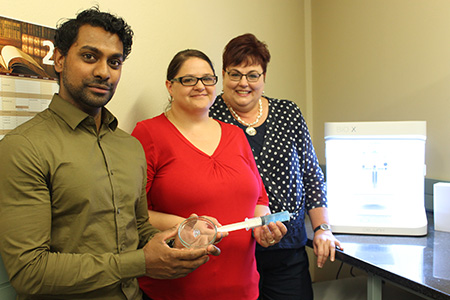The North-West University (NWU) has once again proven that it is dedicated to conducting ground-breaking research within the health field.
The university recently purchased the Cellink BioX, 3D bio-printer, a first of its kind not only in South Africa but also on the African continent. While most 3D printers use inorganic materials such as metals, plastics or other composite materials, the Cellink BioX uses organic materials, including living tissue.
According to Prof Lissinda du Plessis, a professor in clinical pharmacy, bio-printing is the spatial patterning of living cells and other biologics by stacking and assembling them using a computer-aided layer-by-layer deposition approach. Bio-printing is mostly used for the fabrication of living tissue and organ analogs for tissue engineering, regenerative medicine, pharmacokinetics and other biological studies.
Conducting ground breaking research
The ntre of Excellence for Pharmaceutical Sciences (Pharmacen) looks forward to conducting innovative research with the new bio-printer.
“3D bio-printing is a new exciting field of research for us,” says Prof du Plessis. “At the NWU we have unique skill sets that can be utilised on an international level.” She adds that South Africa has unique health-related challenges which need solving, and the bio-printer can contribute significantly to answering some of country’s most pressing research questions.
One of the projects they will conduct is the production of biomimetic skin, which is artificial skin that mimics biological skin. This project will work towards providing skin grafts that can be used in wound healing of burn victims.
Cellink BioX will also be used to produce novel standardised human 3D skin wound-healing models which will be beneficial for topical pharmacological studies on wound healing, and also to manufacture novel 3D disease model systems that will monitor therapy responses.
“The BioX is a versatile bio-printer, equipped with intelligent print head mounts. This means we’ll have the opportunity to easily upgrade the system as we develop new print heads to match our evolving bio-printing needs,” she says.
The printer is not only available to other faculties within the NWU, but it can also be accessed by external parties, other universities and research institutions.

Here are Johan Lövgren, the project manager at Cellink in Sweden, Prof Lissinda du Plessis from the School of Pharmacy and Prof Jeanetta du Plessis, the deputy-dean for research and innovation at the Faculty of Health Sciences.
